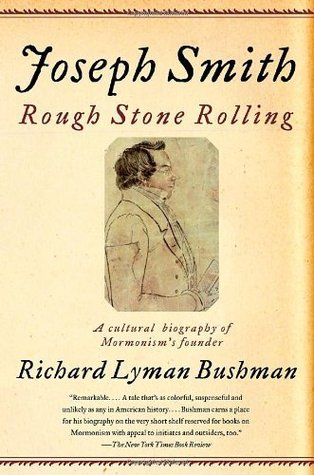What do you think?
Rate this book


740 pages, Paperback
First published January 1, 2005
The accounts of the neighbors picture an unambitious, uneducated, treasure-seeking Joseph, who had never written anything and is not known to have read anything but the Bible and perhaps the newspaper...To account for the disjuncture between the BoM's complexity and Joseph's history as an uneducated rural visionary, the composition theory calls for a precocious genius of extraordinary powers who was voraciously consuming information without anyone knowing it. pg 72The second argument I found compelling was the translation of the Egyptian papyri to produce the Book of Abraham.
Jospeh may have heard apocryphal stories of Abraham, although the Book of Jasher was not published in English until 1829 and not in the United States until 1840. A Biblical dictionary published by the American Sunday School Union summed up man of the apocryphal elements. Whether Joseph knew of alternate accounts of Abraham or not, he created an original narrative that echoed apocryphal stories without imitating them. Either by revelation or by some instinctive affinity for antiquity, Joseph made his own late—and unlikely—entry in the ling tradition of extrabiblical narratives about the great patriarch. pg 292Bushman also was forthcoming in making neutral stances on explaining two beliefs that distinguish LDS cultural and historical aspects. The first was the approval of polygamy in the early Church
Joseph did not marry women to form warm, human companionship, but to create a network of related wives, children, and kinsmen that would endure into the eternities. Like Abraham of old, Joseph yearned for familial plentitude. He did not lust for women so much as he lusted for kin. pg 440The second argument, which most denominations use in the polemic, was the Law of Eternal Progression (pgs 196-202) and the King Follett Discourse
...Joseph modified the Creation story until it appeared that God had not created anything ex nihilo. He did not make the earth "out of Nothing." In Joseph's view, God assembled the earth from preexisting material and then drew a cohort of spirits from the pool of eternal intelligences. pg 421Overall this was an excellent and detailed narrative explaining the LDS faith from a cultural perspective as opposed to information delivery. This was super helpful explaining the Church's organizational structure, theological tenets, and unique concepts that separate the LDS faith from other Christian denominations. I would highly recommend this to anyone interested in early LDS & American history. Thanks!
Most Christian theologians believe if God was not the creator of all, He was no God. In Joseph's revelations, God formed individual earth's inside time and space rather than creating the universe as a whole from the outside. God did not have to create and control existence in order to be God. pg 454